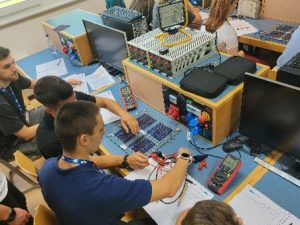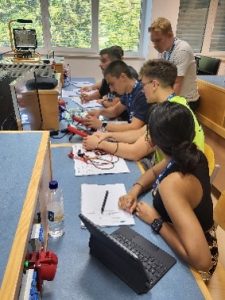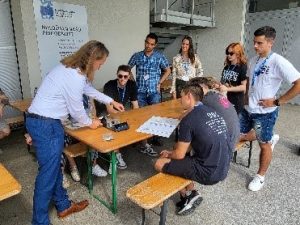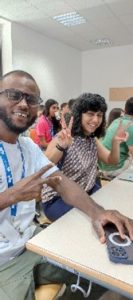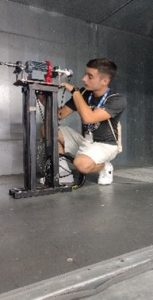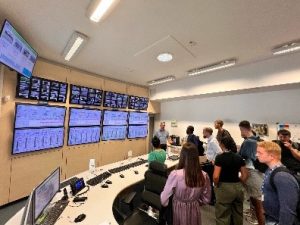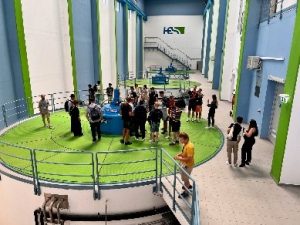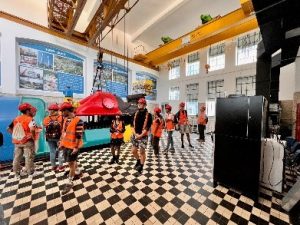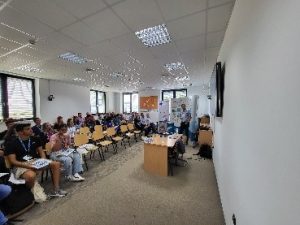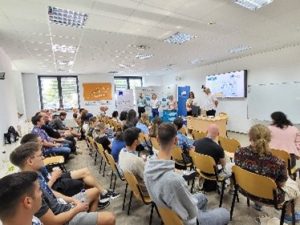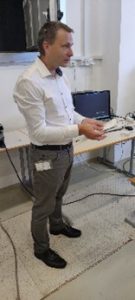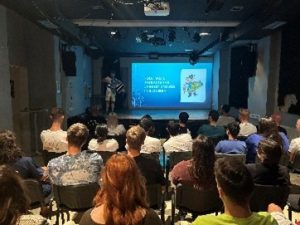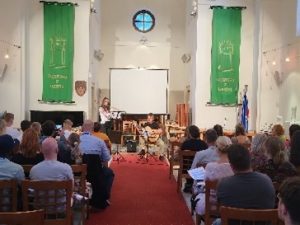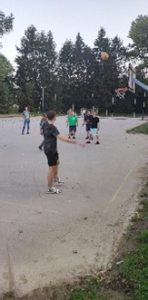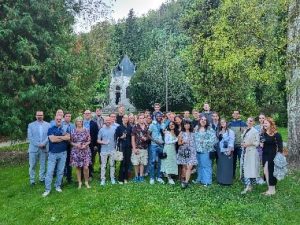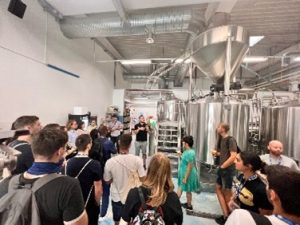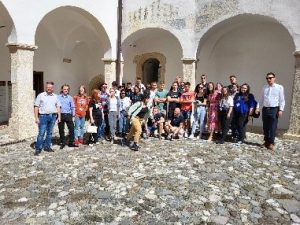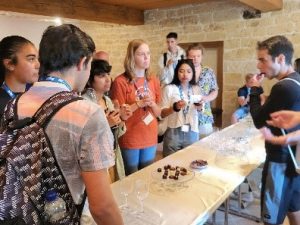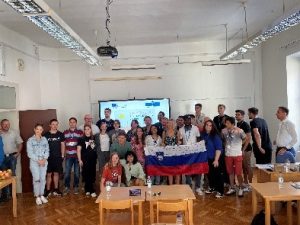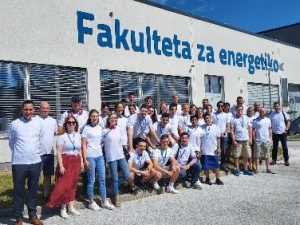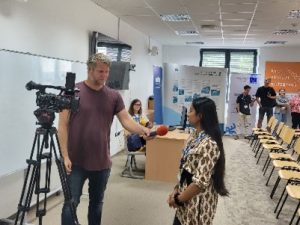PROGRAMMES
RENEWABLE ENERGY SOURCES
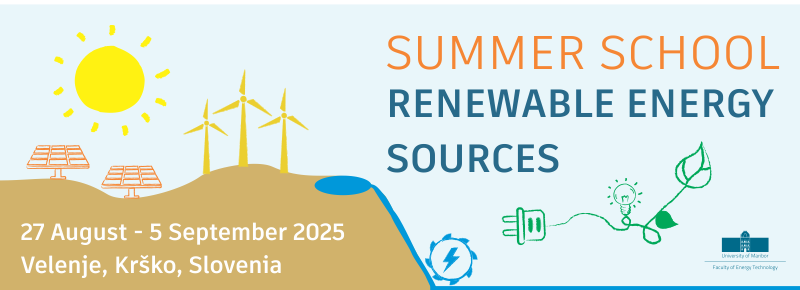
On-site programme: 1 September–5 September 2025
Virtual component: 27 and 29 August 2025
Organisation: Faculty of Energy Technology
Venue: Krško, Slovenia
ECTS: 3
Introduction
Renewable energy sources and the green transition have become pivotal topics in addressing the pressing challenges of climate changes and environmental sustainability. As traditional fossil fuels reserves dwindle and their negative impact on the planet becomes more apparent, the urgent need to shift towards renewable energy has gained significant momentum. Renewable energy sources, such as solar, wind, hydro, and biomass, offer cleaner alternatives that harness natural processes and reduce greenhouse gas emissions.
The Green Transition
The green transition involves a comprehensive shift in energy systems, infrastructure, and policies to prioritize renewable energy adoption and decrease reliance on fossil fuels. This transition encompasses the energy sector and extends to transportation, buildings, industrial processes, and overall resource management. It requires significant investments in research, development, and deployment of renewable technologies, as well as supportive policies, regulatory frameworks, and public awareness campaigns.
Benefits of Renewable Energy
Renewable energy sources offer numerous benefits beyond environmental sustainability. They promote energy independence, reduce air pollution, create job opportunities, and drive economic growth. Additionally, the decentralized nature of many renewable energy systems enables local communities to become self-sufficient energy producers and consumers, fostering resilience and empowering individuals and businesses.
Types of Renewable Energy Sources
During the summer school, students will learn about different types of renewable energy sources, such as:
- Hydrogen technologies
- Solar energy
- Wind energy
- Hydro energy
Laboratory Work
Laboratory work will be organized in the well-equipped laboratories of the Faculty of Energy Technology, University of Maribor in Velenje and the Institute of Energy Technology of the Faculty of Energy Technology, University of Maribor in Krško (https://fe.um.si/VR). These interactive and practical laboratory sessions will enable students to directly engage in the exploration of renewable energy sources.
Excursions
Students will also visit The World of Energy – an interactive centre on energy and the energy industry (https://www.svet-energije.si/en), which is located in the immediate vicinity of the Institute of Energy Technology, in the neighbouring company GEN energija. A professional excursion will be organized where the students will visit the Brežice hydroelectric power plant (https://www.he-ss.si/he-brezice-splosno.html), which is one of the five hydroelectric power plants on the lower flow of the Sava River, and the Brežice solar power plant, which is currently the largest solar power plant in Slovenia. As part of the excursion, students will also visit the Šoštanj Thermal Power Plant (https://www.te-sostanj.si/), where they will explore the sector related to hydrogen technologies. Additionally, they will visit Hisense Europe, Gorenje d.o.o. (https://www.hisense-europe.com/si/), to see the production of appliances and their solar power plant. The tour will also include a visit to the Coal Mining Museum of Slovenia in Velenje (http://muzej.rlv.si/si/).
Guest Lectures
Guest lectures will be delivered by renowned experts from various faculties of the University of Maribor, professionals from leading companies, and international specialists. This diverse line-up will offer students a broader perspective on renewable energy sources, providing insights from both academic and industry viewpoints.
Social Events
Social events will also be organized, prepared by the Student Council of the Faculty of Energy Technology, where participants will get to know each other. A welcome party will be organized as well as an introductory evening and an evening with local drinks and food. Additional activities will include sports games, a tour of the city of Velenje, a quiz pub, a visit to the Velenje beach (https://www.visitsaleska.si/sl/velenjska-plaza/), a performance by the Velenje Music School, and exhibitions at the Velenje Castle (https://muzej-velenje.si/muzej_velenje/velenjski-grad/). These events will provide excellent networking opportunities with international students and experts, enhancing the attractiveness of the summer school.
Cultural Exchange
Cultural exchange activities will allow students to experience local customs, food, and drinks, while team-building activities such as sports games and other interactive events will help build a strong sense of community among participants.
Career Opportunities
Participation in our summer school on renewable energy sources will open doors to numerous career opportunities. The knowledge you gain will help you to achieve your career goals and provide a competitive edge in the job market. The renewable energy sector is constantly growing, meaning that experts with this knowledge are increasingly sought after. Our courses will give you insights into the latest technologies and trends, aiding you in finding employment in various companies, research institutes, and government organizations involved in renewable energy.
Certificates
Upon successful completion of the summer school, all participants will receive certificates confirming their participation.
Programme:
- Virtual part: 27 August–29 August 2025
- Physical part: 1 September–5 September 2025 at Faculty of Energy Technology, University of Maribor in Velenje and at the Institute of Energy Technology in Krško, Slovenia. A detailed program of the summer school will be available soon.
Accommodation: Accommodation and travel costs for the physical event in Velenje are covered by participants (please check with the home institution on the Erasmus grant for BIP). All participants of the summer school have the opportunity to be accommodated in the Youth Hostel Velenje (https://www.mc-velenje.si/hostel), where breakfast is also available.
Application: Students can apply until 20 June 2025. The maximum number of participants is limited to 30.
Students apply at https://forms.cloud.microsoft/e/F7k8f52063.
Highlights from the First Summer School (31 August–8 September 2023)
The first summer school on renewable energy sources took place at the Institute of Energy Technology of the Faculty of Energy Technology, University of Maribor in Krško. Here are some memorable moments and reflections from this event:
- Interactive Laboratory Sessions: Students engaged in hands-on experiments and explored various renewable energy technologies.
- Excursions: Visits to local energy facilities, including hydroelectric and solar power plants, provided practical insights into the industry.
- Guest Lectures: Renowned experts from academia and industry shared their knowledge and experiences, offering a comprehensive understanding of renewable energy sources.
- Social Events and Cultural Exchange Participants enjoyed networking opportunities through various social activities, including a welcome party, sports games, and cultural exchange events. They experienced local customs, food, and drinks, fostering a sense of community and cultural appreciation.
Contact person:
Brigita Ferčec (brigita.fercec@um.si)
Jerneja Klemenčič (jerneja.klemencic@um.si)
The programme is organised as an Erasmus+ Blended Intensive Programme. Students are entitled to an Erasmus+ scholarship for participation in the programme. You can find more information here.
